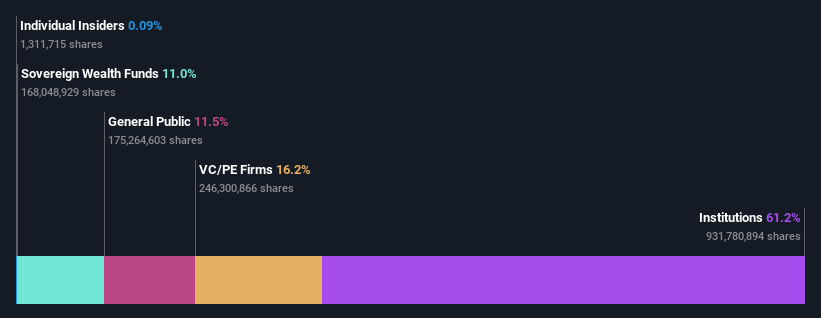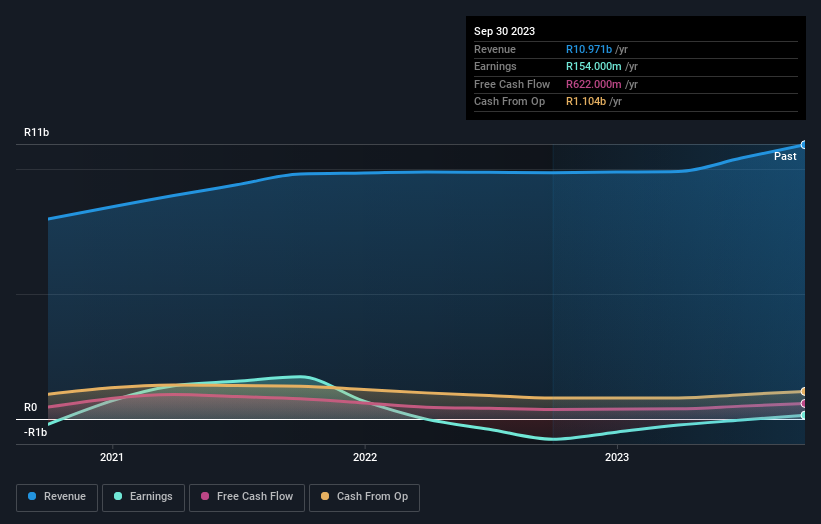- South Africa
- /
- Basic Materials
- /
- JSE:PPC
PPC Ltd's (JSE:PPC) high institutional ownership speaks for itself as stock continues to impress, up 19% over last week

Key Insights
- Significantly high institutional ownership implies PPC's stock price is sensitive to their trading actions
- A total of 5 investors have a majority stake in the company with 53% ownership
- Past performance of a company along with ownership data serve to give a strong idea about prospects for a business
Every investor in PPC Ltd (JSE:PPC) should be aware of the most powerful shareholder groups. The group holding the most number of shares in the company, around 61% to be precise, is institutions. That is, the group stands to benefit the most if the stock rises (or lose the most if there is a downturn).
And as as result, institutional investors reaped the most rewards after the company's stock price gained 19% last week. The one-year return on investment is currently 43% and last week's gain would have been more than welcomed.
Let's delve deeper into each type of owner of PPC, beginning with the chart below.
Check out our latest analysis for PPC

What Does The Institutional Ownership Tell Us About PPC?
Many institutions measure their performance against an index that approximates the local market. So they usually pay more attention to companies that are included in major indices.
PPC already has institutions on the share registry. Indeed, they own a respectable stake in the company. This implies the analysts working for those institutions have looked at the stock and they like it. But just like anyone else, they could be wrong. It is not uncommon to see a big share price drop if two large institutional investors try to sell out of a stock at the same time. So it is worth checking the past earnings trajectory of PPC, (below). Of course, keep in mind that there are other factors to consider, too.

Institutional investors own over 50% of the company, so together than can probably strongly influence board decisions. We note that hedge funds don't have a meaningful investment in PPC. Value Capital Partners is currently the company's largest shareholder with 16% of shares outstanding. Meanwhile, the second and third largest shareholders, hold 14% and 11%, of the shares outstanding, respectively.
To make our study more interesting, we found that the top 5 shareholders control more than half of the company which implies that this group has considerable sway over the company's decision-making.
Researching institutional ownership is a good way to gauge and filter a stock's expected performance. The same can be achieved by studying analyst sentiments. As far as we can tell there isn't analyst coverage of the company, so it is probably flying under the radar.
Insider Ownership Of PPC
The definition of an insider can differ slightly between different countries, but members of the board of directors always count. Management ultimately answers to the board. However, it is not uncommon for managers to be executive board members, especially if they are a founder or the CEO.
I generally consider insider ownership to be a good thing. However, on some occasions it makes it more difficult for other shareholders to hold the board accountable for decisions.
Our most recent data indicates that insiders own less than 1% of PPC Ltd. It seems the board members have no more than R4.8m worth of shares in the R5.6b company. We generally like to see a board more invested. However it might be worth checking if those insiders have been buying.
General Public Ownership
With a 12% ownership, the general public, mostly comprising of individual investors, have some degree of sway over PPC. While this group can't necessarily call the shots, it can certainly have a real influence on how the company is run.
Private Equity Ownership
Private equity firms hold a 16% stake in PPC. This suggests they can be influential in key policy decisions. Sometimes we see private equity stick around for the long term, but generally speaking they have a shorter investment horizon and -- as the name suggests -- don't invest in public companies much. After some time they may look to sell and redeploy capital elsewhere.
Next Steps:
I find it very interesting to look at who exactly owns a company. But to truly gain insight, we need to consider other information, too. Like risks, for instance. Every company has them, and we've spotted 5 warning signs for PPC (of which 1 is a bit unpleasant!) you should know about.
Of course this may not be the best stock to buy. So take a peek at this free free list of interesting companies.
NB: Figures in this article are calculated using data from the last twelve months, which refer to the 12-month period ending on the last date of the month the financial statement is dated. This may not be consistent with full year annual report figures.
New: Manage All Your Stock Portfolios in One Place
We've created the ultimate portfolio companion for stock investors, and it's free.
• Connect an unlimited number of Portfolios and see your total in one currency
• Be alerted to new Warning Signs or Risks via email or mobile
• Track the Fair Value of your stocks
Have feedback on this article? Concerned about the content? Get in touch with us directly. Alternatively, email editorial-team (at) simplywallst.com.
This article by Simply Wall St is general in nature. We provide commentary based on historical data and analyst forecasts only using an unbiased methodology and our articles are not intended to be financial advice. It does not constitute a recommendation to buy or sell any stock, and does not take account of your objectives, or your financial situation. We aim to bring you long-term focused analysis driven by fundamental data. Note that our analysis may not factor in the latest price-sensitive company announcements or qualitative material. Simply Wall St has no position in any stocks mentioned.
Have feedback on this article? Concerned about the content? Get in touch with us directly. Alternatively, email editorial-team@simplywallst.com
About JSE:PPC
PPC
Engages in the production and sale of cement, aggregates, ready mix concrete, and fly ash products in South Africa, Botswana, and Zimbabwe.
Flawless balance sheet with reasonable growth potential.
Similar Companies
Market Insights
Community Narratives



